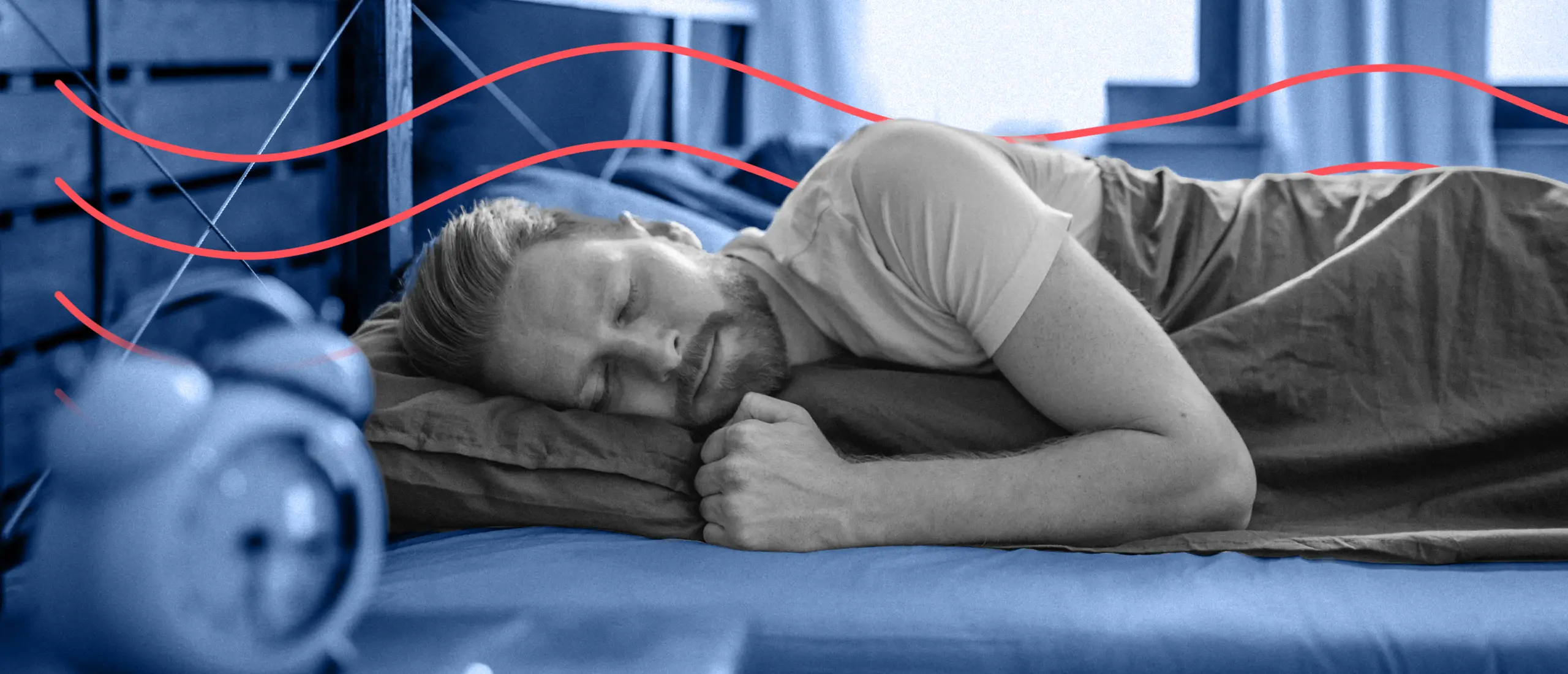Can Glycine Help You Sleep Better?
- By Stephanie Anderson Witmer
- January 31, 2024
Diehard biohackers and wellness-world newbies alike, can probably benefit from some more shut-eye. Even longevity bros like Peter Attia and Andrew Huberman have discussed glycine for sleep as one supplement you might want to add to your stack.
If those nightly Zzzs elude you, you’re not alone. One-third of U.S. adults don’t get enough sleep (1)—an issue that’s more prevalent among men than women, according to the Centers for Disease Control and Prevention (CDC) (2).
Sure, not getting enough sleep can make you cranky and foggy. But it’s also important for maintaining overall health and decreasing your risk of developing serious chronic diseases, including obesity, type 2 diabetes, cardiovascular disease, and depression.
Here’s how glycine might be able to help you drift off to dreamland.
How Glycine Works for Sleep
Glycine is a nonessential amino acid naturally produced by the body that helps with immune function and fights inflammation and oxidative stress (3). Glycine can also improve muscle mass and prevent muscle loss. Research on rats has also indicated that glycine can increase the production of serotonin, which plays a key role in mood and memory (4).
Glycine is also an inhibitory neurotransmitter (meaning it blocks or prevents chemical messages from being passed along through the nerve cells). It’s because of this role in the body that researchers first became interested in glycine as a possible supplement for insomnia, explains June Seliber-Klein, M.D., a board-certified sleep and neurology expert.
“In general, inhibitory neurotransmitters in the brain calm things down,” she says. “So I think it was intuitive, like, ‘let’s see if we can add some more inhibition to the brain and see if we can get it to quiet down and go to sleep.’”
But that isn’t the mechanism in glycine that actually helps you sleep, Seliber-Klein says. Instead, researchers found, it was glycine’s ability to lower body temperature that could be helping people sleep.
Here’s how: glycine binds to NMDA receptors in the brain which play a role in sleep (5). While excitatory glutamate stimulates NMDA receptors to keep us awake, inhibitory glycine chills them out to calm us down and help us sleep. Glycine then causes blood vessels to widen, increasing blood flow to the extremities (6).
When the body heats up, like after an intense HIIT workout, your body cools down by widening blood vessels (called vasodilation), sweating, and the release of body heat from the skin. Your core body temperature needs to drop by a couple of degrees to fall asleep (7).
Seliber-Klein compares what glycine is believed to do in the body to a sleep tip she recommends to patients: the before-bed bath.
“If you take a hot bath, your skin turns red and your blood vessels dilate. That causes vasodilation,” she says. “And then when you get out of the bath, your core temperature drops a little bit. Glycine may work via regulating body temperature.”
About the Expert
June Seliber-Klein, M.D., a board-certified sleep and neurology expert in Monterey, California and chief medical officer for Ognomy, an app that promotes better sleep.
How Glycine Can Help Improve Your Sleep
Research suggests glycine may be able to improve sleep quality in several ways.
You may fall asleep faster—and sleep better
Older research from 2007 has suggested glycine supplementation before bedtime can improve sleep quality and reduce sleep onset latency (the time it takes to fall asleep) (8).
Additionally, research has found sleep onset latency may improve in people with insomnia. That’s a technical way of saying that taking glycine decreased the time it took for study participants to fall asleep once the lights were turned off (9).
How quickly you fall asleep at night is an important metric for sleep researchers. It can tell them not only how long you’re sleeping but also how well you’re sleeping. It should take you about 20 to 30 minutes to fall asleep at night, Seliber-Klein says.
“Too short is not good,” Seliber-Klein explains. “When someone tells me, ‘I fall asleep as soon as my head hits the pillow,’ that might sound good to an insomniac, but maybe that means you’re not getting enough sleep.”
You may not feel groggy in the morning
In a 2012 study, people taking glycine reported feeling more refreshed and well-rested in the morning. This is a real plus for glycine, as it doesn’t appear to leave people feeling totally out of it in the morning (9).
It may prevent some sleep disorders and disruptions
A 2021 review looked at research surrounding REM sleep behavior disorder (RBD) in people with Parkinson’s disease (10). RBD is when people twitch, talk, or even act out their dreams during REM sleep rather than experiencing normal temporary paralysis while asleep.
While dopamine deficiency plays a large role in movement disorders in Parkinson’s, the same review suggests a lack of glycine and GABA (another inhibitory neurotransmitter) may also be at play. RBD is considered to be a precursor to Parkinson’s, often occurring several years before or at the beginning of the onset of the disease (10).
Research published in a 2021 issue of the journal, Nutrients reviewed studies of nutritional interventions athletes could take to improve their sleep. Their sleep is often disrupted by travel, the time of their competitions, and muscle soreness, the study authors wrote. They found supplementing with 3 grams of glycine before bed improved subjective sleep quality and quantity (11).
How to Get More Glycine In Your Diet
Whether by way of foods or supplements, there’s no shortage of ways to include the amino acid in your diet.
Eat glycine-rich foods
The body makes its own store of glycine naturally, and the body needs about 2 grams per day (12). We also get glycine from food—mostly protein sources. If you eat enough protein, you probably get enough glycine, Seliber-Klein says.
Meat, such as poultry, lamb, pork, game, and beef, give you the most bang for your buck. For example, one slice of bone-in ham has more than 5 grams of glycine (13). Fish and dairy are also packed with glycine. On the plant foods side, legumes are a good source of glycine—one cup of red lentils contains just shy of 2 grams of glycine (14).
Supplement with glycine
Seliber-Klein recommends trying to add more protein to the diet before reaching for a supplement. But it may be good for people who aren’t getting enough protein.
“If I’m seeing someone who is a vegan or vegetarian and I think they might not be getting enough protein, we’ll sometimes try the glycine,” Seliber-Klein says.
While there’s no official dosage for glycine supplements, research has shown a common dosage for therapeutic benefits is about 3 grams (15). Check labels first: Some supplements have a daily dosage of 3 grams, while other products are 1 gram or less.
Because it’s a substance the body makes naturally, glycine shouldn’t cause major side effects, especially when an appropriate dose is taken (super-large quantities may result in adverse effects) (16). Always double-check with your doctor before starting any new supplement regimen.
Seliber-Klein has recommended glycine for some of her patients, but she cautions there’s no magic formula for fixing sleep—and no way to know which sleep aid will be effective for you until you test them out.
References
1. Centers for Disease Control & Prevention (CDC). Effect of Inadequate Sleep on Frequent Mental Distress.
2. CDC. Sleep & Sleep Disorders.
3. Anaïs Alves, et al. (2019). Glycine Metabolism and Its Alterations in Obesity and Metabolic Diseases.
4. Makoto Bannai, et al. (2011). Oral administration of glycine increases extracellular serotonin but not dopamine in the prefrontal cortex of rats.
5. Benjamin E. Jewett, et al. (2022). Physiology, NMDA Receptor.
6. Nobuhiro Kawai, et al. (2015). The Sleep-Promoting and Hypothermic Effects of Glycine are Mediated by NMDA Receptors in the Suprachiasmatic Nucleus.
7. Edward C Harding, et al. (2020). Sleep and thermoregulation.
8. Wataru Yamadera, et al. (2007). Glycine ingestion improves subjective sleep quality in human volunteers, correlating with polysomnographic changes.
9. Makoto Bannai, et al. (2012). The Effects of Glycine on Subjective Daytime Performance in Partially Sleep-Restricted Healthy Volunteers.
10. Ștefania Diaconu, et al. (2021). REM sleep behaviour disorder in Parkinson’s disease (Review).
11. Madeleine Gratwicke, et al. (2021). Nutritional Interventions to Improve Sleep in Team-Sport Athletes: A Narrative Review.
12. Meerza Abdul Razak, et al. (2017). Multifarious Beneficial Effect of Nonessential Amino Acid, Glycine: A Review.
13. FoodData Central. Pork, cured, ham, slice, bone-in, separable lean only, unheated.
14. FoodData Central. Lentils, pink or red, raw.
15. Wataru Yamadera, et al. (2016). Glycine ingestion improves subjective sleep quality in human volunteers, correlating with polysomnographic changes.
16. Brigham and Women’s Hospital. Glycine.












